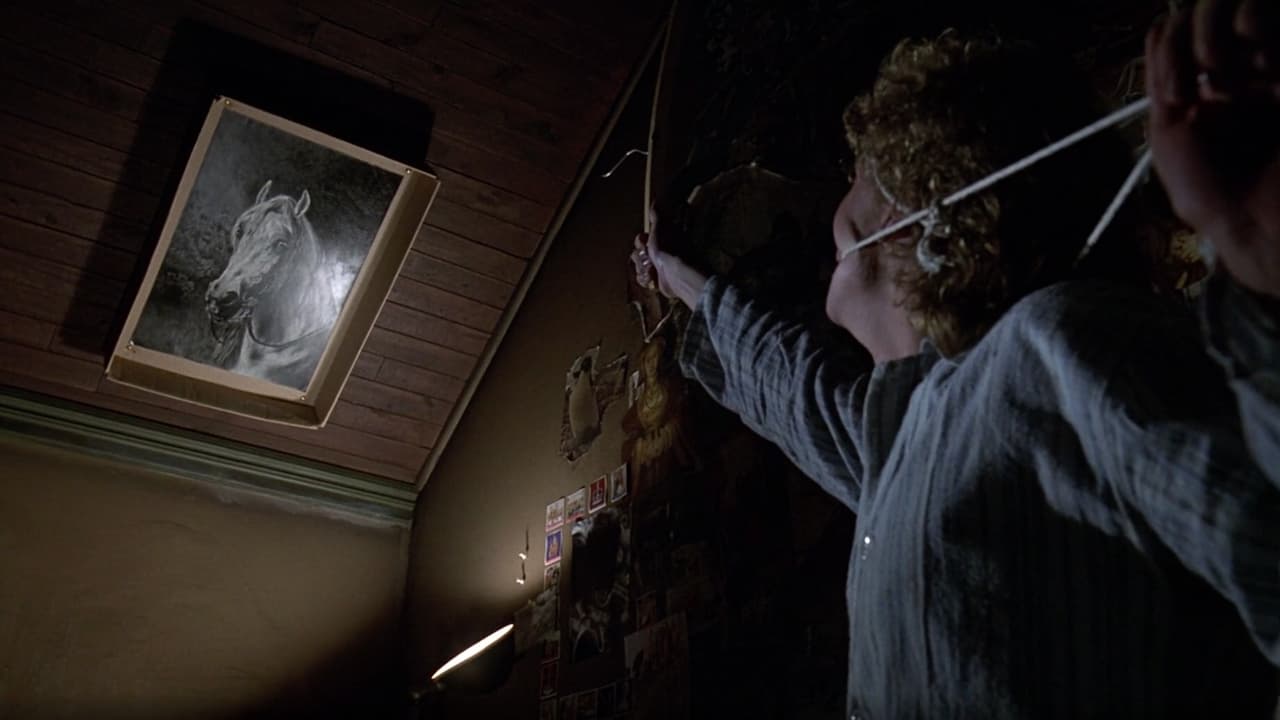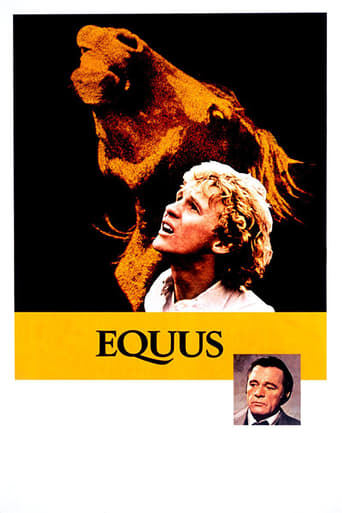

I must admit, I did not know about this film until recently, when I came across it by chance. Well, what a formidable surprise it was, finding out it is actually a great psychological drama.In a nutshell, Equus tells the story of a psychiatrist treating a teenager who was arrested for blinding six horses at the stable where he used to work. The doctor finds out more and more about the boy's strange obsession with horses, which finally makes him doubt about his own perception of reality and attitude towards life.The film sucks you in right from the beginning, with Richard Burton's fourth wall breaking monologue setting the tone for what is to come. The rest of the film is a great psychological study of the characters, especially the boy, Alan Strang (brilliantly played by Peter Firth), but also the doctor (one of the last great roles from Richard Burton). What really impresses me here, is how the film delves into the depths of the human mind and represents many of its complexities and contradictions.Speaking of representation, it is also important to know that Equus is the adaptation of a play of the same name, written by Peter Shaffer. Regarding the dialogues, the film kept the ones from the play. The most interesting thing about the adaptation is how some of the words are converted into images, for example when Alan Strang tells about his experiences with horses. The kind of unsettling and surreal imagery accompanying these moments contributes to the creation of a dream-like mood that takes the film to a new level of immersion.As for the film's substance, I've read somewhere it is supposed to be a metaphor for homosexuality. I don't know if that is true, anyway, the sexual undertone is clearly there. However, this is far from being the only aspect of it. For me, this film raised fundamental questions about the human condition and about what it means to achieve spiritual freedom. What I mostly like about that is how the film portrays the passion needed to attain this freedom. It acknowledges its positive aspect of exaltation, but focuses on the more intriguing negative aspect of suffering. This struggle is brilliantly represented by the doctor who starts doubting if he has the right to cure Alan, thus easing his suffering but also eliminating his true self and his freedom to live spiritual experiences and be more than the everyday man. Another detail I really enjoyed about this film is the aura it creates around the relationship between Alan and the horses. The whole religious aspect of it was very well developed and had an almost mystical quality to it.Finally, if I had to point out something negative about this film, I could probably say that, being the adaptation of a play, it's of course very talky and the dialogues are not always easy to follow. However, in my opinion it was a good choice to keep Peter Shaffer's words in the film. This allows the film to go further in the exploration of the character's minds while also being an important part of its mysterious and haunting atmosphere.So, on the whole I think this is a great film that manages not only to establish particular mood and to tell a compelling story, but also to raise very pertinent questions about the human psyche and our relation to the self and to the world. It tells us about ourselves, as all art should do. The only thing I don't understand is that this is such an obscure film, especially considering it was directed by Sidney Lumet (12 Angry Men, Serpico, etc...). Anyway, this is an excellent film in my opinion and I absolutely recommend anyone to watch this sadly forgotten gem.
... View MoreEquus is a strange and challenging psychodrama that employs strange visual occurrences such as the pentimento effect and a boy who subjects himself to the relative experience of a domesticated horse. There is an extended full-frontal nude scene with two seventeen-year-olds. The crime at the heart of the story is blinding of six horses with a metal spike by one of the seventeen-year-olds, yes, the one who harnesses and whips himself to undergo what a human does to a horse. It is acted with sublime gravity by Richard Burton, Joan Plowright and Peter Firth. And Sidney Lumet tells this highly unusual and intensely deep story with his unerring directorial philosophy of concision, necessity and character fidelity.I said Equus is challenging and strange, but it's not challenging because it's strange, but because it revolves around the act of savagely brutalizing creatures so innately innocent, loyal and beautiful, in a way so tragic in its consequences for them, and yet it is done by the most unassuming youngster, actually one with an obsessive affinity for the creatures he comes to maim. It is a crime so disturbing and yet makes absolutely no apparent sense, even to Richard Burton's veteran psychiatrist, who has dedicated his life to helping and understanding children and teenagers. We begin to think it has something to do with the boy's upbringing. In a sheltered and smothering environment, as an only child on a farm, what enormity of doubt could be instilled in that growing mind when one loving parent reads to him daily from the Bible and the other loving parent disdains it? And yet his atheist father is so sheepish by nature, his deeply orthodox Christian mother so kind and civilized. She at one point urges that they've always shown love and caring for their only son and given him all they could, and desperately demands to be believed. What the hell happened in that stable? Or rather, what could've possibly led to it?It is such a deeply layered, bleakly filmed and painstakingly performed probing of a missing cause and devastating effect that the theme that seems most consistent at its core is purely juxtaposition. I mentioned the term "pentimento," and if you've seen Fred Zinnemann's great film Julia, you've heard the definition of it, how it describes the occurrence of one painting that in its alterations reveals another original painting underneath it. We find that every night for a long time, the boy had a drawing above his bed of a horse. This drawing has been reworked from the initial drawing, one of Christ on the cross. And the eye of this juxtaposed horse is what sets off the boy's deep-seated reaction to crucified Jesus. Or is that what the eye sets off? What is it about this eye that the boy feels is staring at him all night, like it's alive, like it's judging him?The motif of juxtaposition continues its odd, omniscient thread to the psychiatrist himself. As Burton brings to light the realities beneath the boy's demons, he finds himself inexorably confronting his own. The questions he directly poses to us through soliloquy converge with those buried in his disturbed patient. Why do people do such extreme things at all? What is the purpose of preventing them from doing them? Well, because they can be horrible, cruel. I personally may not be able to revisit the tasteful and shocking scene where it is finally shown on screen what this kid did to these horses. I haven't even mentioned the elements of his sexual attraction to horses, the fact that his attraction to Jenny Agutter's character is directly linked to her contact with horses. Or that he and she run into his father outside a porn theater. But can there ever be a certain explanation for this boy? The fact that Burton must hypnotize him or give him a placebo he claims to be a truth pill in order to unearth most of the boy's story is an indication that even its first-hand source isn't reliable; he is shackled by such wildly contradictory impulses that he cannot help but do these things then later has such trouble facing them that he submerges the memories.And yet, the motif of juxtaposition yet again comes full circle, because all in all, this film belongs to Burton, it is his character's story, his to augment or diminish. As the psychiatrist, hampered with a hollow, discontented life of his own submissive doing, Burton has a mere six or seven scenes, from the play's staging, breaking the fourth wall. He bookends the film, and by Lumet's haunting closing shot (a sort of inverted version of his disquieting final long shot in Long Day's Journey Into Night), the camera punctuates the film by tightening not on the eyes of a horse, nor the eyes of Peter Firth, but on Richard Burton's. Encumbered by Lumet's somber, austere London atmosphere, Schaffer's story is an unprecedented and harrowing revelation of how many meaningful layers there are to a meaningless existence. Next time we hear about one person's shocking, unforgivable crime, we may not only say they deserve to go to prison for life or they deserve to die, but that maybe they endowed themselves with significance in the only way they knew how.
... View MoreThis is the predictable over-the-top dramatic tosh that they dished up in the early heyday of Larry's 'National Theatre', when the all-male literati still ruled London. It's loaded with all the required themes: paganism, devil worship, bestiality, Biblical delusions and psychiatry, but what it's really about is why men hate and fear a naked, willing woman, something that the production itself reinforces. A far more interesting topic, IMO, would be how women put up with screwed-up men like Alan Strang (Firth). But that would never do, would it. It's a man's world, and it's Strang who is "feeling pain", not Jill Mason (Agutter), the woman he treated brutally, before deflecting his impotent rage on to his kinky hang-up: horses. And a brilliant doctor has been persuaded to treat Strang, not Mason, who surely requires post-traumatic stress therapy. Author Shaffer cleverly introduces an ironical second layer of plot when shrink Dr Dysart (Burton) reveals that he is jealous of the madman Strang, who may be barmy, but at least he has "known passion", unlike the prosaic doctor. Probably only a cabal of gays could come up with such utter rubbish and win glittering prizes for it. But that was a generation ago, and Equus has slipped into well-deserved obscurity since then.
... View MoreStable boy Alan Strang (Peter Firth) has blinded a number of horses and no one can figure out why. Psychiatrist Martin Dysart (Richard Burton) tries to find out why.I've never seen the stage play so I can't compare it to that but, on its own, this is a pretty dull movie. For starters the main character Alan was an incredibly unlikable jerk. I couldn't have cared less about what happened to him. I thought it was laughably obvious--I had figured out what was going on long before they actually tell us. The pacing in this one is leaden--every scene seems to be dragged out as much as possible. Also the symbolism and "meaning" of this film is about as subtle as a sledgehammer. I actually started to get insulted that everything was being spelled out for us--and in an incredibly slow manner too. It seems the filmmakers thought the audience was composed of a bunch of idiots. It also has a sequence of truly horrifying violence at the end that really didn't need to have been shown. Also there's plenty of nudity in this mostly by Peter Firth.The only thing saving this from being a total disaster was the acting. Joan Plowright is good as Strang's mother and Firth was also good in a very difficult role. But this is Burton's film all the way. He's just superb in his role and manages to single-handedly save this from totally unwatchable. Still, his great acting can't save this film from being a total bore. A 4--and that's just for Burton. This was a critical bomb when it came out--it's easy to see why.
... View More